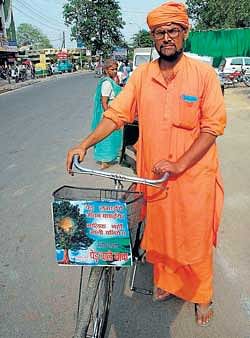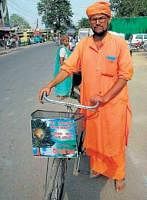
Instead he strongly believes in Rabindra Nath Tagore’s philosophy of ‘ekla cholo re’ (go alone if others do not support you).
And following the same spirit, he rides a bicycle, carries saplings on his bicycle and spreads the message to keep the environment clean and preserve nature.
A familiar face in the city of nawabs, Manish Tewari, a native of Bihar’s Gopalganj district, bordering Uttar Pradesh's Deoria district, is better known as ‘Bicycle Baba’ or the ‘Per wale Baba’ (the tree baba).
And these names have been given to him not for nothing. Clad in saffron dress, the 45-year old Tewari moves from one locality to another on his bicycle in which he carries saplings and bags made of clothes.
His message to the people is unambiguous. Plant more saplings, do not use polythene, preserve the nature and make the environment free of pollution.
In every locality he would knock on doors and the inmates would be surprised, when Tewari offers them a sapling and a bag with a request to preserve the
nature. Many people take him as eccentric. “Sometimes people think that I am out of my mind... they feel the exercise is futile but I am not bothered”, an undeterred Tewari says.
Tewari plants the saplings wherever he finds a suitable location. These places could be government parks, residential colonies. “I take care to choose a place where the saplings can safely grow”, he says.
His work does not end merely with the planting of the saplings. He does a regular follow up. “I regularly visit the places where the saplings had been planted”, he says.
Tewari, who is a graduate, has been planting sapling since 1998 and people close to him claim that so far he has planted over a lakh saplings and that too without taking any help from the government or voluntary organisations. “I do not require any financial help from any one... one can find the saplings during the rainy season... they are scattered here and there”, he said.
Tewari simply picks up plants of ‘peepul’, ‘banyan’, ‘neem’, ‘mango’, ‘tamarind’, ‘jackfruit’, ‘blackberry’ and many others and nurse them as if they were his own children. He takes care of these plants by keeping them in bags and plant them when they grow up a little. “These plants are my life... they are like my own children,” he said.
Wherever the ‘per wale baba’ goes, the saplings of the plants also go with him. He not only carries the saplings of plants but also a `khurpi' (a tool to dig the soil) and a small shovel.
“The tools help me in planting the saplings immediately”, he says. Tewari lays more emphasis on planting medicinal plants. “The medicinal plants provide us medicines also... I feel that they should be planted in large numbers”, he said.
The ‘baba' however is set against bonsai. “Preparing a bonsai plant takes a lot time and energy... we can plant scores of saplings by spending lesser time and energy”, he asserts.
Tewari also regularly visits schools and colleges to spread his message to preserve the nature. He feels that the younger generation must be taught about preserving the nature as only they could save the environment from pollution.
To spread his message, Tewari organises painting, poster and essay competitions at regular intervals, with help from educational institutions. The topics are always related to the nature. “The winners are given saplings as prizes”, Tewari says.
He meets people during his visits to the residential colonies. “I tell them about the importance of preserving the nature and try to persuade them to plant saplings”, he says. The ‘baba’ is happy that in many areas the people have responded to his pleadings. Seeing his total devotion to the trees, the people have now taken up the task of taking care of the saplings in their areas.
On whether he thinks that he will succeed in his endeavour, Tewari says that his job is do whatever he can. “I believe in doing the work and I know that it will bear fruit one day”, he adds.
